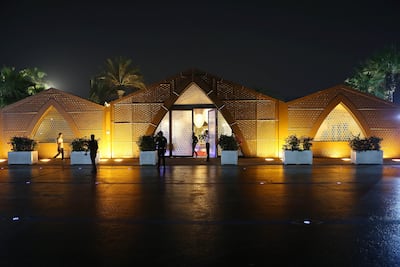Iftar, the meal eaten to break the day's fast, and suhoor, the meal eaten before sunrise, have become the most social aspects of Ramadan over the years. For both of these occasions, friends and family gather to socialise, share a meal and in the case of suhoor, prepare for the next day’s fast.
When not enjoyed at home, iftar and suhoor often take place in Ramadan tents.
There are now countless Ramadan tents across the UAE and the region, erected for the holy month where family, friends and communities can gather to share meals. With elaborate decorations, themed to fit an arabesque or Ramadan aesthetic, this social aspect has become an incredibly popular way for people to mark the most important meal times during the month.

Yet Ramadan tents are a fairly modern tradition.
The photo that introduces this article, undated but taken in the 1960s or 1970s, is of drummer Khamees Abu Tubaila and his entourage walking through the alleyways of Abu Dhabi to wake people for suhoor.
This tradition was common in the UAE, where an assigned drummer would beat his drum, despite some households owning alarm clocks, to announce that it was time for the last meal of the night in preparation for the day’s fasting. It was also a time when families from the neighbourhood socialised. Many residents would walk out, greet the drummer and connect with each other as the day of fasting began.
This was most likely a tradition that evolved from the musaharati, an official public waker for suhoor and the dawn, or fajr, prayer during Ramadan. Often starting an hour before sunrise, the musaharati would roam the streets with his drum, calling out names to wake people up, or reading poems or prayers.
In Islamic history, Bilal Ibn Rabah is often described as the first musaharati and the first muaathin, the person who calls out the adhan, marking out the five daily prayer times. Chosen by the Prophet Mohammed, he was a former Abyssinian slave, known for his deep and melodic voice.
However, with the advent of technology and the urbanisation of many parts of the Arab world, the need for an official person to walk the streets and wake people seems unnecessary.
Yet when people want to connect, traditions have a way of reinventing themselves.


